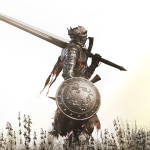|
This is a bit of a different question, but it seems the American Civil War is of great interest to non-Americans. I have to ask, why? As an American it's a very important part of my country's history, and one of my ancestors fought in it, so its attraction for me is obvious. But why the attraction for those who don't have a personal tie?
|
|
|
|

|
| # ? May 12, 2024 22:20 |
|
BurningStone posted:This is a bit of a different question, but it seems the American Civil War is of great interest to non-Americans. I have to ask, why? As an American it's a very important part of my country's history, and one of my ancestors fought in it, so its attraction for me is obvious. But why the attraction for those who don't have a personal tie?
|
|
|
BurningStone posted:This is a bit of a different question, but it seems the American Civil War is of great interest to non-Americans. I have to ask, why? As an American it's a very important part of my country's history, and one of my ancestors fought in it, so its attraction for me is obvious. But why the attraction for those who don't have a personal tie? Everyone likes to think about what would've happened if the south won and slavery continued In seriousness, it's interesting to me because the geographical scale of it was immense; America is a big place. And because it was a war of ideals and not cultures, everyone spoke English and was broadly similar (compared to say, a war between England and France or Israel and the Arab states). Mainly I guess because it was a civil war but on a scale usually reserved for international conflicts. Plus it's got the embryonic formation of trench warfare and machinegun adoption leading up to WW1. That's me anyway. Alekanderu posted:I don't know if a tank made in the 60's could be called "modern" - more modern than the StuG, I guess. It was designed and intended as a main battle tank, though, not as an assault gun/tank destroyer, even if it looks like one. When it was designed, not having a turret wasn't that big a deal; the biggest problem with it is (obviously) that you can't really hit anything while moving, but back then stabilizers were bad enough that tanks couldn't reliably fire and hit on the move anyway, so it wasn't seen as a major drawback at the time. I was meaning more in the sense that they were designed to be used in a purely defensive way and were much cheaper and simpler than a proper MBT.
|
|
|
|
|
Slavvy posted:...everyone spoke English and was broadly similar... Edit: And a bunch of Jews in the South for some reason. Savannah was full of Jews. Edit 2: You're broadly right, but if we can't sperg in the milhist thread then where can we? HEY GUNS fucked around with this message at 22:31 on Dec 8, 2013 |
|
|
|
Slavvy posted:edit: isn't the s-tank basically a modern Stug? The intended use is basically the same AFAIK. Not either doctrinally or tactically. Germans built lots of StuG's on tank chassis because they couldn't afford building as many tanks with 75mm guns. Meanwhile peacetime Sweden built Stridvagn-103's rather than turreted tanks because they thought it would fulfill the intended role just as well. But the Stridvagn-103 was always designed for the role of a turretless tank rather than WW2 assault gun.
|
|
|
|
Slavvy posted:I was meaning more in the sense that they were designed to be used in a purely defensive way and were much cheaper and simpler than a proper MBT. Yes, but they were not designed to be purely defensive, since a tank that can only be used for defense is no tank at all. Although they were primarily intended to fight Soviet armor in delaying actions, they were also meant to be used in counter-attacks and to attack Soviet bridgeheads. They were also neither cheap nor simple; if anything, the S-tank suffered from being over-engineered due to its many unconventional features. The hydraulic suspension used in aiming the gun, for example, was highly complex, and maintenance was difficult.
|
|
|
|
Nenonen posted:Meanwhile peacetime Sweden built Stridvagn-103's rather than turreted tanks because they thought it would fulfill the intended role just as well. But the Stridvagn-103 was always designed for the role of a turretless tank rather than WW2 assault gun. Which is why it had a second driver and a second set of steering controls to go in reverse?
|
|
|
|
So firing on the move still wasn't A Thing in the 60's then? Seems like the disadvantage would be immense in any kind of attacking capacity if you had to stop and turn the entire tank to aim. I realise accuracy would probably have been on par with a conventional turret but tactically it seems extremely limiting for anything other than firing from prepared positions at pre-sighted lines of attack.
|
|
|
|
|
a travelling HEGEL posted:Yeah, this is racist and nobody should take it seriously. Almost every single sentence in that bullet point list deserves to be quoted here and mocked openly. That paper has been discussed in military circles forever; the general consensus nowadays is that it would be much better if it were titles "why incompetent leaders lose wars" because next to none of it has anything to do with anyone being Arabic or Muslim and everything to do with being corrupt and stupid and selfish (which are traits that are not unique to Arabs). It does actually raise some good points about officer professional development and the like but hardly anything revolutionary. BurningStone posted:This is a bit of a different question, but it seems the American Civil War is of great interest to non-Americans. I have to ask, why? As an American it's a very important part of my country's history, and one of my ancestors fought in it, so its attraction for me is obvious. But why the attraction for those who don't have a personal tie? I think there are a ton of reasons for this but I'll take a stab at naming the big ones: - It was the first huge war of the industrial era, arguably the first war ever wherein large portions of economies and so forth were fully mobilized - It is deeply steeped in the neverending debate about federalism and the role and power of government in a democracy - It was the first time (and arguably the last time) a democratic major industrial power seriously fought against itself so it has a lot of implications and whatnot for modern democratic governments - At its heart it addressed the great ethical question of the age and answered it pretty decisively - It was just massive in scope and a ridiculous number of people died - It was (again, arguably) the first war of the industrial/democratic age that was fought with a prominent racial backdrop Anyway I think the overarching reason is that it touched on a lot of issues that are universal (federalism, racism, rebellion, etc), plus the general narrative and the sheer scope of the war are pretty interesting as wars go, at least in my opinion.
|
|
|
|
BurningStone posted:This is a bit of a different question, but it seems the American Civil War is of great interest to non-Americans. I have to ask, why? As an American it's a very important part of my country's history, and one of my ancestors fought in it, so its attraction for me is obvious. But why the attraction for those who don't have a personal tie? I wouldn't say it's too well known by people without a keen interest in (military) history. Sure, people know about abolitionism and Lincoln, but most (even those with background in Social Studies etc.) would be hard pressed to name a single battle, perhaps with the exception of Gettysburg. To those who fancy history, it's an accessible study in what happens when late industrial weaponry enters the battlefield, as well as the most visible means of a fundamental political transformation taking place in the USA. Perhaps it's different in the UK and the Civil War is more widely studied there? But I've spent a year of uni studies in England, and based on that have no reason to believe so.
|
|
|
|
bewbies posted:That paper has been discussed in military circles forever; the general consensus nowadays is that it would be much better if it were titles "why incompetent leaders lose wars" because next to none of it has anything to do with anyone being Arabic or Muslim and everything to do with being corrupt and stupid and selfish (which are traits that are not unique to Arabs). It does actually raise some good points about officer professional development and the like but hardly anything revolutionary. Are you going to do anything about getting plagiarized, by the way? Can you do anything?
|
|
|
bewbies posted:That paper has been discussed in military circles forever; the general consensus nowadays is that it would be much better if it were titles "why incompetent leaders lose wars" because next to none of it has anything to do with anyone being Arabic or Muslim and everything to do with being corrupt and stupid and selfish (which are traits that are not unique to Arabs). It does actually raise some good points about officer professional development and the like but hardly anything revolutionary. That sums it up pretty well. It's just a fascinating conflict and (from what I understand) neither side was particularly inept. Both sides had some brilliant (and some lovely) commanders, there were battles focused on movement and maneuver, as well as battles focusing on siege warfare, it was probably the last major effective use of cavalry, it was the first time that rail infrastructure played a massive part in the logistics of warfare, and it was right on the border between the older style of 'gentleman's war' and the industrial, machinelike warfare of the 20th century. It's just a really interesting war by war standards. Most wars pretty much just boil down to stuff happens, there's a couple of decisive battles and everything just ends on a flat note.
|
|
|
|
|
Slavvy posted:So firing on the move still wasn't A Thing in the 60's then? Seems like the disadvantage would be immense in any kind of attacking capacity if you had to stop and turn the entire tank to aim. I realise accuracy would probably have been on par with a conventional turret but tactically it seems extremely limiting for anything other than firing from prepared positions at pre-sighted lines of attack. You pretty much hit the nail on the head without realizing it-the S-Tank was designed purely for defense. The Swedish military realized that they wouldn't be able to stop a concentrated Soviet push, but by maximizing the defensive potential of Sweden's terrain they could hopefully hold out long enough for NATO to get involved. The S-Tank was effectively the epitome of this doctrine, as it was able to go hull-down extremely effectively while being fast enough to scoot back to the next line of defense before it got overrun. Like you said it would be almost useless on the attack, but Sweden's terrain would preclude most armored thrusts in any case.
|
|
|
|
Slavvy posted:So firing on the move still wasn't A Thing in the 60's then? Seems like the disadvantage would be immense in any kind of attacking capacity if you had to stop and turn the entire tank to aim. I realise accuracy would probably have been on par with a conventional turret but tactically it seems extremely limiting for anything other than firing from prepared positions at pre-sighted lines of attack. Assuming you have to stop the tank anyway to deliver accurate fire - which was true when the S-tank was designed - not having a turret does not present any particular disadvantage. You'd stop, turn (which the S-tank could do much faster than the traverse rate of tank turrets at the time), aim, fire. Acebuckeye13 posted:You pretty much hit the nail on the head without realizing it-the S-Tank was designed purely for defense. The Swedish military realized that they wouldn't be able to stop a concentrated Soviet push, but by maximizing the defensive potential of Sweden's terrain they could hopefully hold out long enough for NATO to get involved. The S-Tank was effectively the epitome of this doctrine, as it was able to go hull-down extremely effectively while being fast enough to scoot back to the next line of defense before it got overrun. Like you said it would be almost useless on the attack, but Sweden's terrain would preclude most armored thrusts in any case. Again, this is not true. It was certainly intended to be used in an offensive role as well as defensively. There's also plenty of good tank country in Sweden, especially in the more populated southern parts of the country. Alekanderu fucked around with this message at 23:09 on Dec 8, 2013 |
|
|
|
That makes me wonder: how did they correct for the tank not being on level ground, back before computers and poo poo? I'm not meaning just fire a few shots and see what happens, I mean was there any more sophisticated type of system to compensate for the tank not being parked level? Like, if you're parked on the side of a hill and your target is further along the slope of the hill, your tank is on a list. So you traverse and elevate the gun to point roughly in the right direction, but the fall of the shot will be 'to the side' instead of directly in the elevation axis of the gun. You would have to have some sort of gyroscopically stabilised sight or something, wouldn't you?
|
|
|
|
Slavvy posted:That makes me wonder: how did they correct for the tank not being on level ground, back before computers and poo poo? I'm not meaning just fire a few shots and see what happens, I mean was there any more sophisticated type of system to compensate for the tank not being parked level? Before the latest generation of sighting apparatus, you aimed using a glass sight with marks etched into it. You judged the elevation based on how the target appears in the sight(there are marks on the glass to assist). Judging the traverse left/right is done by eye. You fire a shot. If it hits, you're good. If it misses, you make a mental note of where the round impacted and adjust your sights. Fire and adjust. 
|
|
|
|
|
bewbies posted:That paper has been discussed in military circles forever; the general consensus nowadays is that it would be much better if it were titles "why incompetent leaders lose wars" because next to none of it has anything to do with anyone being Arabic or Muslim and everything to do with being corrupt and stupid and selfish (which are traits that are not unique to Arabs). It does actually raise some good points about officer professional development and the like but hardly anything revolutionary.
|
|
|
|
Slavvy posted:That makes me wonder: how did they correct for the tank not being on level ground, back before computers and poo poo? I'm not meaning just fire a few shots and see what happens, I mean was there any more sophisticated type of system to compensate for the tank not being parked level? Few tanks had stabilizers of any kind. The Soviets had T-26es with stabilized sights, but I don't know how many. They experimented with some stabilizers for T-34s, T-34-85s, and LL Shermans, but nothing really came of it. The Americans had stabilized guns, but apparently they were so bad, the crews would often disable them so they wouldn't get in the way. The Germans started experimenting with stabilized sights (their guns were too huge to stabilize the whole thing), but didn't get far before the end of the war. As for shooting off sub-optimal terrain, you adjust your aim after missing based on the observation of your commander (or another crewman, if the commander is also the gunner). Hitting a target on the first shot was quite unlikely in an offensive operation.
|
|
|
|
Slavvy posted:That sums it up pretty well. It's just a fascinating conflict and (from what I understand) neither side was particularly inept. Both sides had some brilliant (and some lovely) commanders, there were battles focused on movement and maneuver, as well as battles focusing on siege warfare, it was probably the last major effective use of cavalry, it was the first time that rail infrastructure played a massive part in the logistics of warfare, and it was right on the border between the older style of 'gentleman's war' and the industrial, machinelike warfare of the 20th century. For me the figures involved are particularly lively. As is the debates such as the endless one about McClellan for example they are all really interesting and the involvement of politics into the conflict is fascinating. In regards to Arab- Israeli warfare and the various literature it is a bloody minefield with Bias everywhere. The whole cultural- physiological aspects,I do see their is some validity as comparing them with similar forces elsewhere the cultural difference are significant and they do effect the fighting ability especially in conventional warfare. (That's what make the Jordanians interesting due the very strong links with UK and having the most competent by far force apart from the Israelis.)
|
|
|
|
a travelling HEGEL posted:Almost everyone. There were Hispanic Union troops in New Mexico, Irish immigrants on both sides, German immigrants fighting for the Union, and French-speaking Louisianans fighting for the Confederacy. There's kind of a funny personal story about German immigrants in the Civil War. There was a big wave of German immigrants to Texas in the 1840s (including my own ancestors), and right about the time they were finally settling in, the Civil War happened and the Confederate draft went into effect. There were a number of incidents of German immigrants and governmental forces clashing over their refusal to fight, including a few massacres. In my family, though, they had a much more clever solution. They wore bonnets and dresses to work the fields during the day, and slept in the woods at night. That way, the crops came in on time and they didn't have to fight for a war they didn't care about. On the other side of my family, they joined some sort of Texas Homeguard or something to avoid getting drafted. Their job was basically to live on the frontiers and watch for attacks against pioneers. That's the story of how my ancestors draft dodged the Civil War. SpaceViking fucked around with this message at 00:57 on Dec 9, 2013 |
|
|
|
the JJ posted:e: It can also be a bit of a 'jury duty' phenomenon with conscripted national militaries. The ones actually competent enough to fill those jobs are also the ones competent enough to find something better to do with their lives. This isn't limited to conscript militaries. There's been growing attention for the past couple of years on the brain drain in the US military, for example. There's a lot of consternation because to make it to colonel or above, you either have to play politics successfully or backstab mercilessly, which leads most of the actual leaders and competent officers to bail as captains or majors. It's going to be pretty interesting to see if someone can figure out a way to quantify what's going on and actually produce a study. Everybody's got the anecdotes, but that's not good enough. It'd be interesting as hell to read, but I can't wrap my head around how to actually study it effectively.
|
|
|
|
During the American Civil War, did the Union have any contingency plan for the capture of Washington? Would capturing Washington really decide the war in the Confederacy's favor?
|
|
|
|
Slavvy posted:Soveits: "...well in that scenario you just use your overwhelming numbers and enormous airforce to saturate their defences. Simple!" Soviets: "And if that doesn't work, just retreat and wait for the winter!" Syrians: 
|
|
|
|
echopapa posted:Soviets: "And if that doesn't work, just retreat and wait for the winter!" Look at the current weather forecast for Syria: fog, rain, fog, snow, below freezing at night. It's not General Winter, but it sure as hell is different from the "Jesus Christ there's a nice breeze, I had forgotten about winter!" (dixit: my mom 5 mins ago) along the Gulf coast.
|
|
|
|
Syria is about the same latitude as the Carolinas. It's not equatorial.
|
|
|
|
Sorry if this has been asked, I have yet to go through the thread. When did battles switch from primarily melee focused affairs to primarily ranged? Was it a specific conflict where they went "ah-ha!" or was it an era or specific leader or invention?
|
|
|
|
I've read Matterhorn twice now and I was wondering if someone can better explain some of the issues the book highlights, particularly the disconnect between the reality of the lower levels (Company and below?) and the goals/orders/assessments of the "middle managers" (operations level, I suppose). Is that something that plagued that war in particular? I know the book is based on the authors own experiences so I shouldn't necessarily view it as indicative of the entire war. But the chain of events becomes more and more infuriating with The company sent on a long patrol without food, ordered to cover impossible amounts of ground, and then ordered to attack the heavily fortified hill that they themselves had fortified - and against a conventional attack that the NVA never would have mounted. From what I remember of the previous thread some really good posts were made as to why the US never could have won Vietnam but I'm hoping someone could talk a bit about the increasing use of long distance radios and the micromanagement of small units by commanders completely removed from the actions themselves. The book suggests this first happened in Vietnam; commanders back at the base making the sorts of decisions that in WWII would have been made a the company level. I'm reminded of in the Wire when The mayor-elect promises to focus on real police work and not stats, but then once he's elected he faces the same political pressures as his predecessor and begins to harp on stats he knows are meaningless . And not to be overly dramatic but I also thought of my own time at Wal-Mart and seeing how goals and information could be distorted by large organizations/bureaucracy. So was Vietnam a turning point (in U.S. history anyway) when this became a bigger problem or has it always been a problem and Matterhorn is just particularly bitter criticism of it?
|
|
|
|
Are there any accounts of German soldiers, having broken through the Allied lines during the Spring Offensive in 1918, marveling at the seemingly limitless supply of artillery shells, food, and other provisions and then for the first time coming to the conclusion of "yeah, we're hosed"? I seem to recall reading ones before but I might be confusing it with something else. Maybe when the Germans broke through during the Battle of the Bulge.
|
|
|
|
Shimrra Jamaane posted:Are there any accounts of German soldiers, having broken through the Allied lines during the Spring Offensive in 1918, marveling at the seemingly limitless supply of artillery shells, food, and other provisions and then for the first time coming to the conclusion of "yeah, we're hosed"? I seem to recall reading ones before but I might be confusing it with something else. Maybe when the Germans broke through during the Battle of the Bulge. Pretty sure All Quiet on the Western Front has a scene where the narrator cuts off a bloody slice of bread taken from a killed American. And I distinctly recall such an account from a soldier during the Battle of the Bulge. Might have been in Ambrose's Citizen Soldiers.
|
|
|
|
Shimrra Jamaane posted:Are there any accounts of German soldiers, having broken through the Allied lines during the Spring Offensive in 1918, marveling at the seemingly limitless supply of artillery shells, food, and other provisions and then for the first time coming to the conclusion of "yeah, we're hosed"? I seem to recall reading ones before but I might be confusing it with something else. Maybe when the Germans broke through during the Battle of the Bulge. I haven't recalled reading anything about the average german soldier thinking that in WW1, though since it did happen in WW2 its very likely some German units were 'demoralized' upon finding Allied stocks. The "oh gently caress we've lost" statements mainly come from high command when reports of the offensive breaking down, because the starving German troops are looting food rather than fighting, finally trickle up to them
|
|
|
|
Shimrra Jamaane posted:Are there any accounts of German soldiers, having broken through the Allied lines during the Spring Offensive in 1918, marveling at the seemingly limitless supply of artillery shells, food, and other provisions and then for the first time coming to the conclusion of "yeah, we're hosed"? I seem to recall reading ones before but I might be confusing it with something else. Maybe when the Germans broke through during the Battle of the Bulge. Pretty sure that story was from the Battle of the Bulge, though no idea if it's true either.
|
|
|
|
Shimrra Jamaane posted:Are there any accounts of German soldiers, having broken through the Allied lines during the Spring Offensive in 1918, marveling at the seemingly limitless supply of artillery shells, food, and other provisions and then for the first time coming to the conclusion of "yeah, we're hosed"? I seem to recall reading ones before but I might be confusing it with something else. Maybe when the Germans broke through during the Battle of the Bulge. The last chapters of "Storm of Steel" tell about that. In the last great offensive, Jünger and his men get into the enemy's trenches they loot everything they can get their hands on. He marvels at the great equipment and the foodstuffs of the allies, while he and the guys are all sick and starved. It's been some time since I read it, but I think he realizes by then that the war is lost. That book is pretty intense. Power Khan fucked around with this message at 12:38 on Dec 9, 2013 |
|
|
|
InspectorBloor posted:The last chapters of "Storm of Steel" tell about that. In the last great offensive, Jünger and his men get into the enemy's trenches they loot everything they can get their hands on. He marvels at the great equipment and the foodstuffs of the allies, while he and the guys are all sick and starved. It's been some time since I read it, but I think he realizes by then that the war is lost. That book is pretty intense. Yeah in a bit of a coincidence I just read through a passage of GJ Meyer's A World Undone when he talks about that as well. A German lieutenant writes about overrunning a rear-area British kitchen during the first day penetration of Operation Michael and there's still bacon sizzling on the pans and a wealth of tobacco and rations that him and his men eagerly help themselves to. Interesting parallel to the Bulge story.
|
|
|
|
It's almost the same scene. He checks out a dugout and there's tea on the stove and cookies and all that.
|
|
|
|
Slavvy posted:Wouldn't classical era bows be significantly less powerful anyway? Look at the physics. I don't know the specific numbers, but for composite bows, crossbows and so on to have such power the 'muzzle velocity' would have to be pretty decent. If you fire a projectile in an arc, the speed that it hits the ground is basically the same as the initial velocity (minus air resistance I'll admit). We know that the Achaemenid Persians used composite recurve bows, so they weren't "primitive". While bows on the Greek mainland, in places like Thessaly or whatever, might not have been very strong (I don't know) there is no real reason to suppose that contemporary Persian archery was really any weaker than what you would see a thousand or more years later. Now, arrows from that part of the world were, by the 13th century, lighter than those you'd see on continental Europe. This means they'd have less momentum so they'd lose more energy from a deflection, but I cannot imagine it to be enough for the pikes to offer more than slim protection over and above the armour the phalangites already wore. brozozo posted:Would capturing Washington really decide the war in the Confederacy's favor? Christ yes. The capture of Washington would drastically undermine the authority of the Lincoln's government and at the very least lead to Lincoln's defeat in the 1864 election. Rodrigo Diaz fucked around with this message at 16:56 on Dec 9, 2013 |
|
|
|
Rodrigo Diaz posted:Christ yes. The capture of Washington would drastically undermine the authority of the Lincoln's government and at the very least lead to Lincoln's defeat in the 1864 election.
|
|
|
|
gradenko_2000 posted:Could they have potentially pulled it off, though? From what I've read Washington DC was ridiculously well-fortified because of its proximity to the Confederates and its importance as the capital, and that even Lee's invasion of the north was more about flanking it, threatening it and forcing the government to flee it and/or engaging the Army of the Potomac on good ground than actually trying to capture the city. Oh yes, there's no doubt about that, I was just trying to emphasise the importance of such defences. Washington was heavily protected, ringed by forts and rammed with soldiers. Even though the majority of forts were south of the city,there were still a lot in the northern part. Any army trying to take it would have been badly mangled and easily repulsed. 'DC' And 'Washington' were not synonymous in those days, and it's cool to see how the city has grown. You can see the civil war fortifications on this map:  edit: there's a bigger version on wikipedia
|
|
|
|
Had the Confederate Army pressed its advantage after the First Battle of Manassas, or Bull Run (if you prefer), in all likelihood they could have indeed taken Washington, as the Federal Army was in complete disarray;quote:At Washington the scenes that followed the battle were disheartening for the Federal cause. The city openly avowed its satisfaction at the Confederate victory. The volunteers showed up badly after their defeat. Discipline was at an end; drunkenness and disorder of the worst kind reigned supreme. The gravest anxiety prevailed, and a change of commanders was decided on that brought McClellan to Washington. Whether McClellan was any better than McDowell may be doubted, but at all events from that moment it was recognized by the Administration that the military problem was one for experts, and could not be solved by a handful of improperly organized three months' volunteers. The map posted is from 1863, 2 years after the battle, at the time of the first Bull Run, most of the fortifications did not exist, and it's very likely given the state of the Union army's morale, mounting any kind of defense would have been problematic at best.
|
|
|
|
Outside Dawg posted:Had the Confederate Army pressed its advantage after the First Battle of Manassas, or Bull Run (if you prefer), in all likelihood they could have indeed taken Washington, as the Federal Army was in complete disarray; The problem is, the Confederate Army was also in disarray after the battle, and this is a common motif of Civil War campaigns. The idea that either army would have done much in response to a victory at first Bull Run is probably overstating the functionality of the armies involved.
|
|
|
|

|
| # ? May 12, 2024 22:20 |
|
There was absolutely no way the CSA ever had any real chance to take Washington. In a best case scenario, say, they won at Gettysburg, they're still having to attack the most heavily defended city on earth plus the remainder of the Army of the Potomac. This would, at best, require a lengthy siege, which the CSA was absolutely in no way prepared to conduct. As an example, Sherman, with a far better equipped and far better supplied army operating against a vastly inferior force and a much less fortified city only barely managed to take Atlanta (and he needed a lot of help from Hood to do it). Same deal with Grant at Vicksburg and Petersburg.
|
|
|































